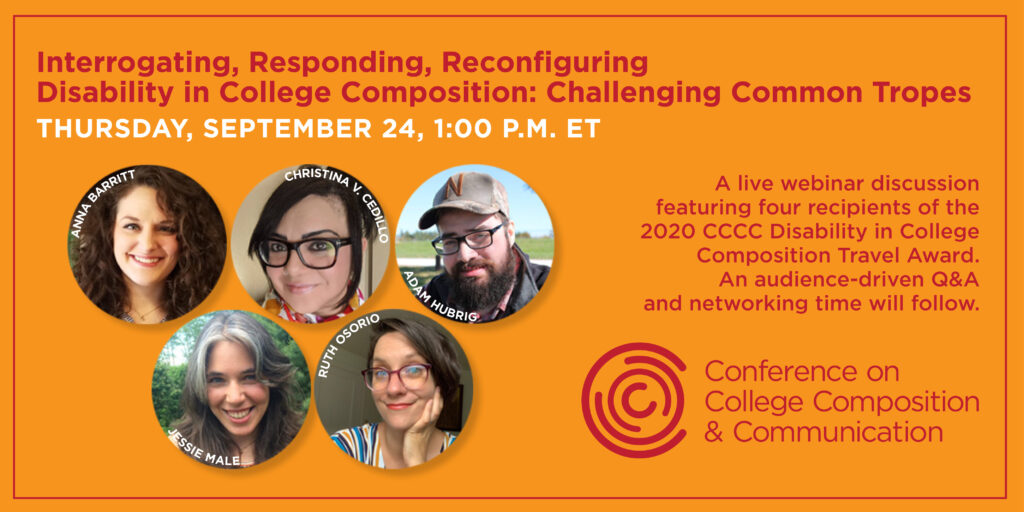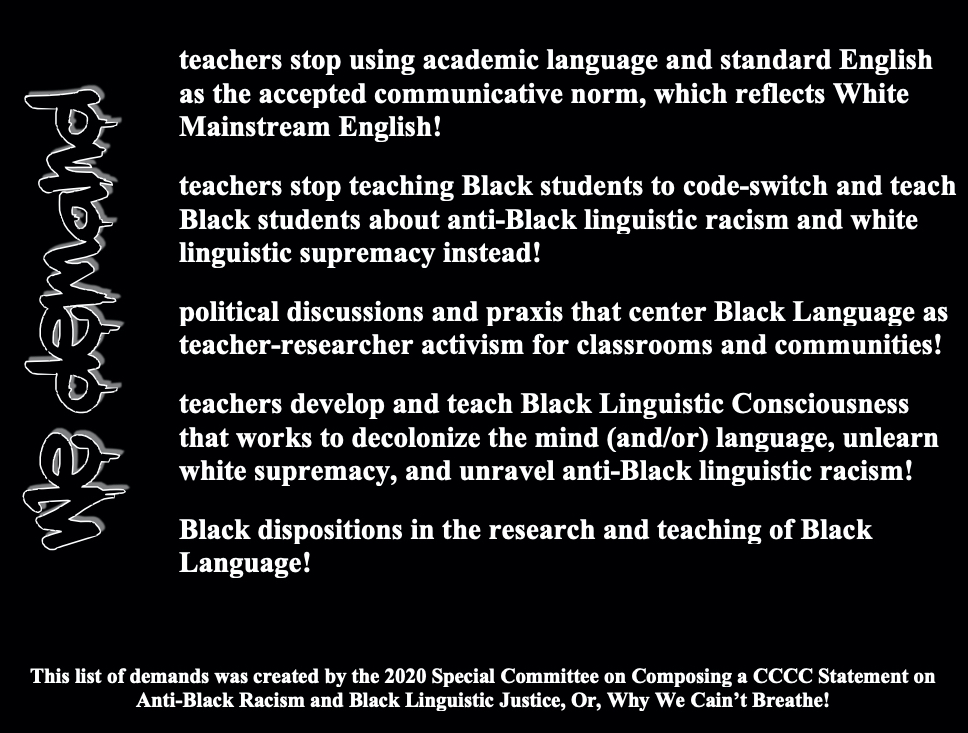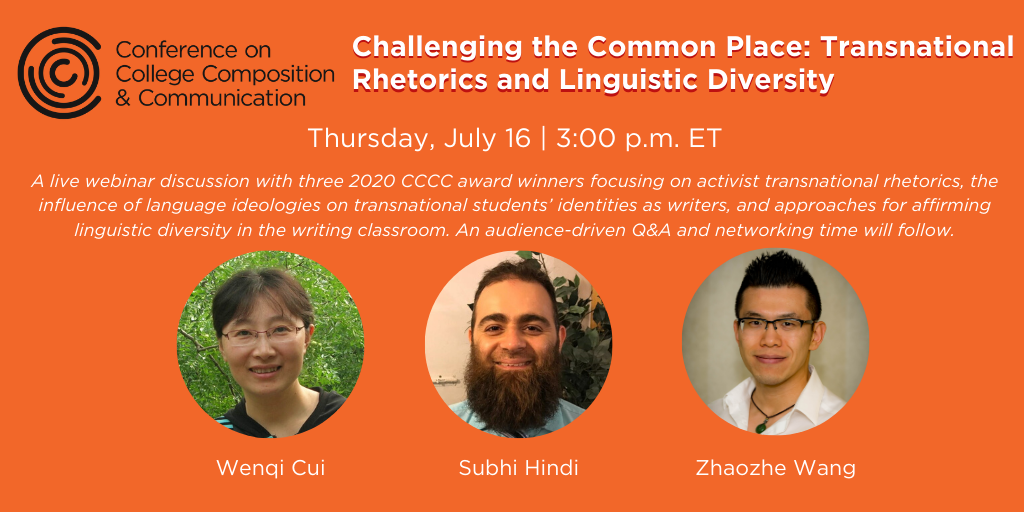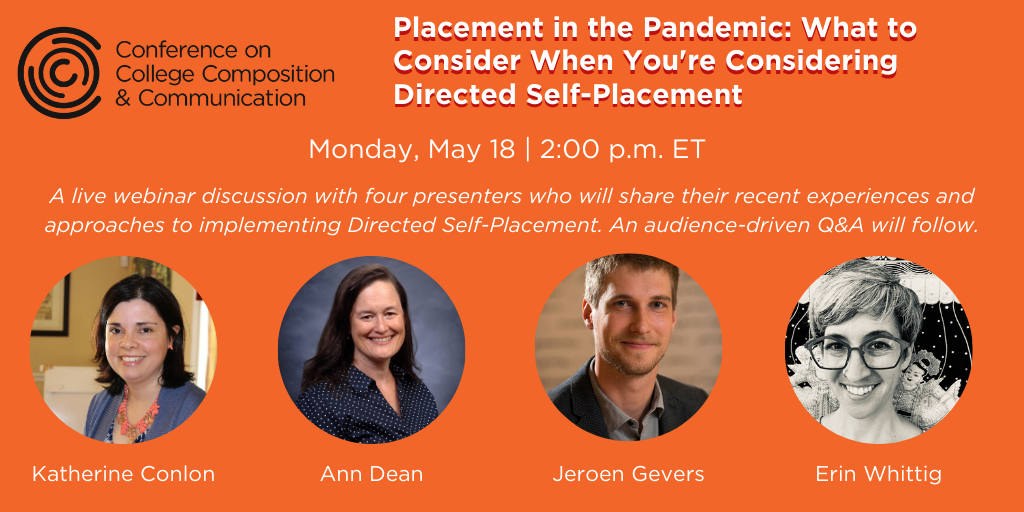June 2020, Archived November 2025
This statement was archived in November 2025 and is no longer an active CCCC statement. The statement is provided here for historical purposes only.
The COVID-19 pandemic has created not only an unprecedented public health crisis but also significant challenges for educators and educational institutions. In response, professionals must reassess current restrictions on assembly and mobility as well as imagine new means for meeting our goals. All our familiar educational routines—for example, meeting in classrooms—must be refigured as social distancing mandates direct us to remain isolated and to avoid public spaces where human contact is possible. Typically, writing courses have small class sizes and include significant levels of interaction, group work, and peer-to-peer discussion. For this reason, holding classes online rather than in person is the safest instructional approach for reducing exposure to and circulation of the novel coronavirus. That said, we recognize that each program will make its own judgments about how it plans to ensure the health, wellbeing, and safety of instructors and students, using institutional guidance specific to their local context. In any of those contexts, instructors and students should have the right to maintain their safety and thus have the ability to be accommodated with remote teaching and learning environments.
We acknowledge that no single document or statement can account for every institutional circumstance, and the goal of this statement is to provide guidance on effective pedagogy in this unique set of conditions. Drawing explicitly from professional statements, guidelines, and resources that have been produced by the National Council of Teachers of English and other professional organizations, CCCC and CWPA offer the following guidance to best support students and instructors adapting to program and classroom changes in the coming year.
Core Principles of Effective Writing Instruction
Because guidance from experts and administrators may be absent or continuously evolving, it can be difficult to prioritize what to give the greatest consideration to among what can seem like endless competing priorities. Here, we offer core principles of effective writing instruction drawn from disciplinary research, and we have synthesized recommendations offered by organizational documents and scholarship in writing studies.
1. Writing classes teach writing: Principally, writing classes foreground writing itself as a complex, distributed activity premised upon sociality and community formation, processes and materials, flexibility, and ethical communication. Writing classes may involve participants in purposeful interpersonal interactions (discussions and conversations), writing-related activities (peer review, studying features in model texts), and interpreting texts (making meaning individually or together with others); however, the activity of writing itself continues to be central to what a writing class sponsors.
a. Supporting students
i. Encourage discussions of habits, experiences, attitudes, and dispositions regarding writing at intervals throughout the course of study.
ii. Invite reflection through which writers identify and articulate a relationship between class-related activities, their development of a particular composition, and their development as writers, generally.
iii. Invite students to discuss and reflect on writing excerpts and models as a form of inquiry and discovery.
b. Supporting instructors
i. Reaffirm instructors’ (individual or collective) understanding of and comfort with the writing-oriented goals of class activities (such as discussion, reading and interpretation, or review within the context of remote or online instruction).
ii. Suggest and model scaffolded writing projects that aid instructors in identifying connections (and discovering new connections together with students) across a number of defined activities as well as the arc of a project’s development.
iii. Advocate for making room within the class to write, urging writers to generate text incrementally, to document processes and materials, and to reflect openly upon decisions, gains, and struggles.
2. Writers need readers: In online classes, students signal their participation through writing, and one common concern about online classes is that students may feel disengaged from the instructor and their classmates. Writing classes can cultivate engagement by ensuring that students have readers for their writing who then respond in a variety of ways.
a. Supporting students
i. Provide ample opportunities for students to read and respond to one another in a variety of informal and formal writing contexts at several stages of the writing process. Model how students can respond in meaningful ways.
ii. Migrate effective practices of peer feedback on drafts into the online platform, devoting adequate time to the complex processes involved in giving and receiving feedback. Provide students with guidance on strategies for using annotation tools to read and respond to drafts. Link these practices with strategies for using feedback to improve student writing.
iii. Provide regular feedback on student work in a timely manner. When possible, feedback could be delivered in audio or video formats as well as in writing if it meets the needs of the students and instructor.
b. Supporting instructors
i. Provide instructors with resources on how to engage in effective, actionable feedback using digital annotation tools and other strategies.
ii. Provide instructors with strategies for managing the workload of reading and responding to student writing, including affirming that they are not obligated to respond immediately to email at all hours and professional wellbeing includes setting firm limits for online availability beyond what is reasonable (e.g., no evening and weekend availability).
iii. Provide guided opportunities for instructors to learn and use recommended platforms before using them with their students.
3. Writing is a process: As a long-established first principle for writing instruction, process emphasizes the ways complex composing tasks play out in relation to time. A process-based approach to writing signals occasions for writers to write iteratively (repeating steps or redrafting), incrementally (breaking large tasks into smaller pieces), and socially (giving and receiving feedback and making decisions about which feedback to heed). The privileging of process provides appropriate and sufficient time for writing and invites writers to interact with others while showing and sharing their in-progress work.
a. Supporting students
i. Signal to writers estimates for time on task, both for longer projects (e.g., multi-week writing tasks) and for specific reading and writing activities (e.g., reading and annotating an article or developing a provisional draft).
ii. Encourage writers to show their work, to pause to document moments when they made a choice; acknowledge the intersections of process with new (or changing) environments, platforms, and materials.
iii. Establish occasions for reflection whereupon writers engage questions of self-awareness, messiness, decision and indecision, and the realization of self-set goals and/or course goals. Reflection serves broad goals of habit formation and attentiveness to development as recursive.
b. Supporting instructors
i. Provide instructors with calendars annotated to include recommended timelines for peer review to ease workload and for their own reviewing and presenting of feedback to writers. Calendars calibrate appropriate time devoted to tasks, thereby expressing benchmarks for timeliness, and acknowledging the relationship between academic calendars and labor for instructors and students.
ii. Model distinctions between commenting and grading practices; this guidance should, when possible, heed timeliness and responsiveness suited to the writing task and be cognizant of effective practices for “early and often” formative and summative assessments of students’ work.
iii. Reinforce with instructors the sufficiency of their literacy sponsorship in that the sum of writing in a writing course includes the complex, comprehensive range of artifacts involved: drafts and notes, communications with instructors and peers, and myriad related compositions. Put another way, in helping instructors conceptualize workload, encourage them to include all the literacy activities, formal and informal, that students will be producing in a course as they are planning learning activities.
4. Writing classes are communities: The small, discussion- and workshop-based pedagogies characteristic of writing classes can and ought to be adapted for remote learning environments. We draw here from NCTE’s Guiding Principles for Understanding and Teaching Writing: “Writers grow in a culture/community of feedback” and the CCCC’s position statement on OWI: “Students’ motivation as learners often is improved by a sense of interpersonal connectedness to others within a course.” Any shift to new classroom formats should retain the small class sizes necessary to foster the frequent student–student and student–teacher interactions that are integral to writing instruction.
a. Supporting students: Because of the high levels of interaction between student and instructor, writing classrooms—especially first-year composition classrooms—are often the primary sites in which students develop a sense of belonging to extended academic communities. Therefore, every effort must be made to sustain and even increase the opportunities students have to interact with each other and their instructors, whether these classes are held in socially distanced classrooms or online.
i. Provide students with multiple ways to interact with each other for a variety of distinct, interrelated purposes: to build and sustain a classroom community; to co-construct knowledge; to exchange and test ideas; to give and receive feedback on each other’s work; and to hone their communication skills in digital, public spaces
ii. Provide students with more than one way to interact with the instructor and to access and discuss feedback: email, phone, discussion boards, announcements, conferencing tools, etc. Use language that provides a clear timeframe within which the instructor is available or when students can expect responses to questions.
iii. Provide students with more than one way to view or access critical content (web pages, uploaded documents, short videos with transcripts, etc.) and regularly solicit student feedback to ensure content and materials are accessible and usable.
b. Supporting instructors: Current campus closures, limited future reopenings, and limited in-person work means that instructors are learning to teach remotely while isolated from their colleagues, departments, and professional networks. The overlapping affective burdens, pedagogical challenges, and professional anxieties instructors face in this moment cannot be overstated. Therefore, every effort must be made to keep instructors connected to each other to maintain their sense of belonging to their institutional communities and ensure that they have access to adequate hardware and software for their professional responsibilities as well as pedagogical mentoring, technological training, and professional support.
i. Create frequent opportunities for instructors to interact with each other through one or more of the following:
1. composition faculty support groups of 5–8 instructors that meet virtually and exchange resources through accessible electronic channels
2. virtual office hours, meetings, or town halls for specific populations like graduate instructors and NTT faculty with program and department leadership
3. department-wide assemblies that provide regular updates and answers to faculty concerns or questions
ii. Provide access to a variety of opportunities for instructors to develop their online teaching skills. These opportunities should be available both synchronously and asynchronously and could include the following:
1. department training programs designed for OWI
2. campus-based online teaching training programs focused on online pedagogy, not technology
3. workshops and webinars to assist instructors with technology
4. an online repository of curated resources, including a place for faculty to share their own teaching resources
5. drop-in support with instructional designers
6. information about external workshops and trainings sponsored by professional organizations
iii. Solicit feedback regularly from instructors to ensure that instructors’ needs are being met as adequately as possible through low-stakes forums, such as focus groups and anonymized polls, Google Forms, Google Docs (a “scratch pad” of ongoing issues), and surveys. Feedback requests should be sensitive to existing workloads.
5. Flexibility: Writers, teachers, and students all use flexibility in their roles. We draw here from the definition of flexibility found in the Framework for Success in Postsecondary Writing: “the ability to adapt to situations, expectations, or demand.” In periods of crisis, flexibility is even more important in order to adapt to rapidly changing circumstances. We encourage habits of mind on the part of both students and instructors (and program decision-makers) that will make it possible for everyone learning in a virtual classroom to do their best work.
a. Supporting students
i. Provide students with multiple ways to interact with the instructor and to access and discuss feedback as instructors’ comfort level allows. This can range from email, phone calls, video conferencing tools (as wide a range as feasible within personal or institutional constraints), whole-class discussion boards, individual LMS conversation spaces (asynchronous or synchronous), etc.
ii. Provide students with multiple ways to view or access critical content (web pages, uploaded documents, short videos), and include tutorials or explanations in order to help them learn which ways they are most proficient so they can request assistance in the areas they struggle. Instructors should ensure class activities can be accessed by students at a later time. In asynchronous online classes, also consider that students may be in a time zone different from the instructor; instructors should be aware of the need to adjust deadlines or course material availability in response to this.
iii. Prioritize self-assessment models for students—that is, assessment strategies that allow students to make room for risk, disruptions, and the affordances of discoveries—such as cover letters, author’s notes, online journals in an LMS or Google Docs, reflective writing, or self-assessment discussion threads.
b. Supporting instructors
i. Allow for flexibility where appropriate so that instructors can engage with the course material according to their interests, expertise, or preferences in programs where instructors are teaching with a course template.
ii. Give instructors the freedom to recognize when the course may not be going according to plan. Provide a forum for instructors to share challenges and crowdsource ideas for modifications, one that is both stable and accessible by all instructors in the department.
iii. Understand that not every instructor will be comfortable in the digital learning environment, so provide patience and guidance when discomfort is expressed
6. Fairness/ethical practices: Throughout the shift to responsive learning that must adjust to a range of circumstances, instructors and department leaders should consider the fairness and ethics of their decisions. Recognizing that fairness is not the same as equity and also recognizing there are no consequence-free decisions that can be made during this time, we encourage literacy educators and writing program administrators to use some of the following principles to help them navigate and work through the implications of particular decisions with colleagues:
a. Relevant to supporting students and instructors
i. Create clear guidelines around accessibility, technological expectations, and other core requirements of online and remote learning so that all students and instructors are aware of what will be needed (and can request support in advance of a crisis situation).
ii. Be mindful of how courses might be designed so that they function effectively with low bandwidth, are able to be accessed in alternative formats, and have flexible deadlines for assignments when possible. Students and instructors face material circumstances during the pandemic that might include limited access to technology or stable internet, shared family computers, and increased caregiving responsibilities.
iii. Use a broad set of assessment practices that are agile, flexible, and responsive to the needs of students, instructors, and programs, particularly in the current moment, when our usual approaches are disrupted.
b. Supporting students
i. Consider the range of material circumstances within which students will be accessing their learning and build in curriculum or assessment options that will account for varying situations. For example, policies that allow for dropping an assignment or task from evaluated work, a “late pass” that all students can use a specified number of times in the semester, or student choice in assignments and assignment topics that allows students to work from their strengths and with the materials at hand.
ii. Consider extending due dates or expanding the eligibility for incompletes given the increased instability of and disruption to their schooling that students who are taking multiple courses remotely and managing many deadlines may be experiencing.
iii. Provide multiple paths to meeting course-learning outcomes and flexible deadlines so that students who may have trouble accessing remote classes or the university’s servers are able to achieve course goals.
c. Supporting instructors
i. Recognize that writing instruction requires small group interactions, emotional labor, and coaching that functions differently than some other disciplines. Provide resources so that instructors can both create boundaries around this work and offer resources to students (for example, importable resources that can be automatically added to course sections within an institution’s learning management system [LMS] rather than created from scratch by each instructor).
ii. Consider ways to document and make the work of instructors visible in their professional materials so that it can be accounted for in the evaluation and renewal process.
iii. Ensure all instructors have access to adequate technology to support their work.
Policy and Program Decision Considerations
1. Nearly all college students take a first-year writing course, one that can serve as a “gatekeeper” for access to other courses across the curriculum, to upper-division writing course requirements, to graduation, or to other curricular options. Program decisions should be acutely sensitive to the way that they may affect any of the following:
a. Student retention to higher education (for example, deadlines for dropping or withdrawing from courses)
b. Satisfactory Academic Progress
c. Financial Aid
d. Transfer articulation agreements
2. All instructors who are translating and redesigning courses to a remote, online, HyFlex, blended, or other model will be spending additional hours of labor on this work. Instructors should be fairly compensated for this labor; compensation might include stipends, release time, streamlined workloads, or professional credit for this work which requires training, professional learning, and additional expertise. We encourage decision-makers to use creative and logical strategies for recognizing the labor of course redesigns in new modes.
3. Instructors should have agency to adjust their teaching context in order to better meet the needs of their students and to maintain a safe employment environment.
4. In the case that instructors receive compensation from their institution for developing online course materials, the expectation of joint ownership should be the standard. Instructors retain the rights to their intellectual property, and in the case that the institution uses materials in other contexts, permission should be received and credit should be given to the individual faculty member who has created those materials.
5. Departments, colleges, or institutional policies should not impose mandates about what percentage or proportion of instruction should be synchronous. Each discipline and institution has diverse needs that should acknowledge the pedagogical content knowledge that instructors bring to their classrooms and allow them to make judgments about how and whether synchronous meetings are required, optional, or not a component of the course. In whatever situation, students should be made aware at the outset of the commitment they are making to synchronous instruction.
6. Above all, assessments and pedagogical choices should prioritize learning and students’ successful demonstration of stated course objectives and learning outcomes, not time spent in an LMS or behavioral measures that may reflect access to material resources (e.g., technology, space, time) more than achievement of course goals.
Further Resources
AAUP: American Association of University Professors
CCCC: Conference on College Composition and Communication
CWPA: Council of Writing Program Administrators
GSOLE: Global Society of Online Literacy Educators
NCTE: National Council of Teachers of English
The Online Writing Instruction Community
TYCA: Two-Year College English Association
Work group members:
- Beth Brunk-Chavez, University of Texas-El Paso
- David Green, Howard University
- Holly Hassel, North Dakota State University
- Lyra Hilliard, University of Maryland
- Derek Mueller, Virginia Tech
Reviewed and approved by the CCCC Executive Committee and the CWPA Executive Board, June 2020.
This statement was archived in November 2025 and is no longer an active CCCC statement. The statement is provided here for historical purposes only.










